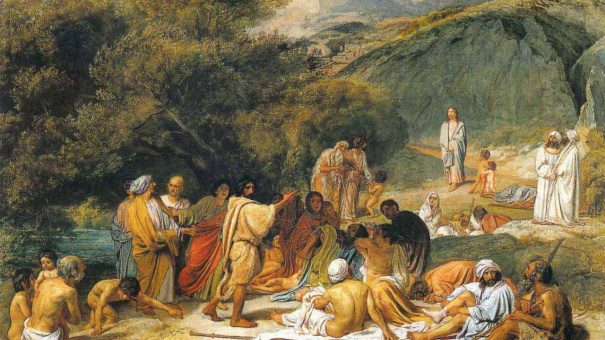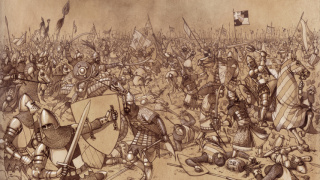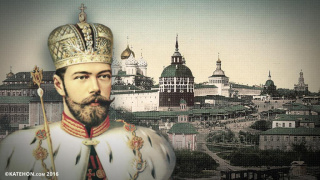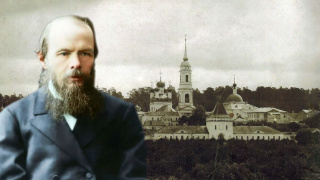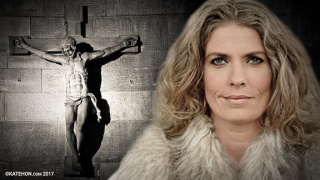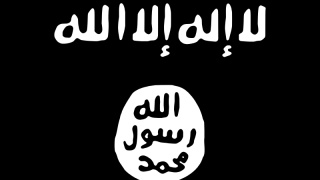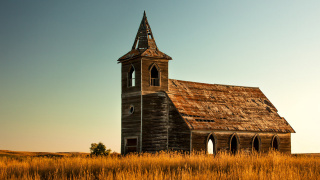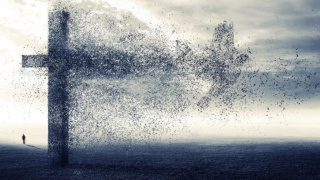Universal Man
While there are many virtues in the peoples comprising the United States, very many of them are also living in delusion. The firm, unshakable belief of the MAGA conservatives that Donald Trump is under the special protection or blessing of God, despite his continuing to do things that the Lord explicitly warns us against (such as giving approval to same-sex ‘marriages’), is an excellent illustration.
But this delusion stems from a larger system, Americanism, that is in opposition to traditional, Apostolic Christianity (i.e., the Orthodox Church). Like the Gnostics, adherents of Americanism believe that man is already a divine being: Each individual has shards or splinters of divinity within him (his natural, God-given rights); salvation is as simple as being enlightened of this fact and then doing whatever is necessary to actualize and exercise those rights as fully as possible. Alexander Hamilton of New York State expressed it this way: ‘The sacred rights of mankind are not to be rummaged for among old parchments or musty records. They are written, as with a sunbeam, in the whole volume of human nature, by the hand of the divinity itself, and can never be erased or obscured by mortal power.’ The Declaration of Independence, authored mainly by Thomas Jefferson of Virginia, said it more famously in these words: ‘We hold these Truths to be self-evident, that all Men are created equal, that they are endowed by their Creator with certain unalienable Rights, that among these are Life, Liberty, and the Pursuit of Happiness—-That to secure these Rights, Governments are instituted among Men, deriving their just Powers from the Consent of the Governed, that whenever any Form of Government becomes destructive of these Ends, it is the Right of the People to alter or to abolish it, and to institute new Government, laying its Foundation on such Principles, and organizing its Powers in such Form, as to them shall seem most likely to effect their Safety and Happiness.’ John Adams of Massachusetts also adds, ‘They have, undoubtedly, antecedent to all earthly government, -- Rights, that cannot be repealed or restrained by human laws -- Rights, derived from the great Legislator of the universe.’ Likewise, Benjamin Franklin: ‘Freedom is not a gift bestowed upon us by other men, but a right that belongs to us by the laws of God and nature.’
It follows from this that most wicked act in the world is to restrain man from exercising his divinity, his Rights; and the greatest enemy of man is therefore the external tyrant (political or otherwise) who restricts one’s actions. The tyrant is to be opposed and overthrown at any cost, even one’s own life. Examples:
‘Men are also bound, individuals and societies, to take care of their temporal happiness, and do all they lawfully can, to promote it. But what can be more inconsistent with this duty, than submitting to great encroachments upon our liberty? Such submission tends to slavery; and compleat slavery implies every evil that the malice of man and devils can inflict.’ (Simeon Howard of Massachusetts)
‘Is life so dear, or peace so sweet, as to be purchased at the price of chains and slavery? Forbid it, Almighty God! I know not what course others may take, but as for me, give me liberty or give me death!’ (Patrick Henry of Virginia)
Martyrdom for individual liberty and rights is the thus the highest honor a man may attain in this life in the United States (see, e.g., the ‘martyrs’ of the Alamo in Texas).
Finally, all those who ascribe to this creed of Liberty make up a new nation, a new Church even, in which old identities give way to a new one:
‘Where liberty dwells, there is my country.’ (Benjamin Franklin)
‘God grant, that not only the Love of Liberty, but a thorough Knowledge of the Rights of Man, may pervade all the Nations of the Earth, so that a Philosopher may set his Foot anywhere on its Surface, and say, 'This is my Country.’ (Ibid.)
‘Tis a Common Observation here that our Cause is the Cause of all Mankind; and that we are fighting for their Liberty in defending our own.’ (Ibid.)
The atomized individual of Americanism, walled off from all people he doesn’t care to associate with, recognizing and actualizing his divine rights, his divine nature, has achieved universal consciousness, has become True Man, Universal Man (a false belief, as we shall see).
How does this differ from Christianity?
To begin with, the Orthodox Church does not emphasize the ‘sacred rights’ of man but rather his fallenness. Americanism teaches that man has already attained the likeness of God due to his possession of ‘unalienable Rights’; he just doesn’t know it yet. Christianity says that man is indeed made in the image of God, but has lost the likeness, which he must regain not by a Gnostic epiphany of lost knowledge but by acts of repentance, a life of ascetic labors done out of love for God and neighbor. Instead of freedom from restraints on the will, the Orthodox way emphasizes cutting off one’s own will: ‘Blessed is the man who has become humble and cut off his own will, and has been led to his own resurrection, to apatheia, to the lack of any movement of the heart and nous toward evil. This is holiness’ (Fr Peter Heers, ‘Orthodox Great Lent’)
Attaining holiness is the ultimate freedom in the Orthodox Church. Thus, the tyrants for her are those things that prevent her children from reaching that state – whether internal or external, whether the devil and his demons or our own fallen, disordered passions, whether government officials or family members or friends or strangers:
‘Now the manner of life in Paradise is an image of fasting, not only insofar as man, sharing the life of the angels, achieved likeness to them by being content with little, but also because those who lived in Paradise had still not dreamt up what humans later discovered through their inventiveness [i.e. “civilization”]: there was still no drinking of wine, still no animal sacrifices, not to mention whatever else beclouds the human mind. It is because we did not fast that we were banished from Paradise. So let us fast that we may return to it. . . do not take the serpent as your advisor, who suggests that you eat out of regard for the flesh’ (St Basil the Great, ibid.).
‘…Adam chose the treason of the serpent, the originator of evil, in preference to God’s commandment and counsel, and broke the decreed fast. Instead of eternal life he received death and instead of the place of unsullied joy he received this sinful place full of passions and misfortunes, or rather, he was sentenced to Hades and nether darkness. Our nature would have stayed in the infernal regions below the lurking places of the serpent who initially beguiled it, had not Christ come. He started off by fasting (cf. Mk. 1:13) and in the end abolished the serpent’s tyranny, set us free and brought us back to life’ (St Gregory Palamas, ibid.).
Martyrdom for Christ is thus the highest good for a Christian, imitating the self-sacrifice of the Limitless, Uncreated Son of God Who united Himself to our sick, decrepit human nature and suffered and died upon the Holy Cross to heal it:
‘And in the next place, when He put on a created nature and became like us in body . . . having undergone death for us and abolished it, He was the first to rise, as man, for our sakes raising His own Body. Henceforth He having risen, we too from Him and because of Him rise in due course from the dead’ (St Athanasius the Great, in Fr Peter Heers, ‘Revelation’, Lesson 4).
‘It is not by accident that in the Greek language the word witness and the word martyr are the same... So Christ is also a true witness, a true martyr because he was martyred on the cross. HE WAS RAISED UPON THE CROSS FOR THE SAKE OF THE TRUE WITNESS OR MARTYRIA. Since the martyria or witness of the truth is indispensably connected to sufferings and the fierce attacks of the devil – the devil-held world rather – the word martyrion in Greek means both witness and suffering’ (Elder Athanasius Mitilianaios, ibid.).
The new people comprised of those united to Christ is not the Universal Empire of American Liberty but rather the Kingdom of God, the Orthodox Church:
‘Now once we come to the realization that being a Christian means that I am a citizen of a kingdom, that I am a king and priest, then how can we ever say again that Christianity is one of the religions? How can we compare it to man-made religions? Christianity is not a religion dreamed up by men. It is a revelation, and therefore a kingdom. So, as a Christian, my purpose is not to use my faith to make my life easier and more pleasant here on earth. A Christian is not the person who pays his taxes, obeys the laws of the country, and raises a good and nice family. It seems that this is how we have been taught to size up today’s good Christian: a good and honest member of society’ (Elder Athanasius, in Fr Peter Heers, ‘Revelation’, Lesson 5).
‘Christians constitute a unique people…elect genos, holy nation, which belongs to God, for they have different principles, a different spirit, a different way of life from the world which does not wish to belong to God…Christians are descendants and spiritually trace their roots to Christ. They are organic members of Christ. And this is why they inherit wealth of the kingdom and a spiritual priesthood….’ (Fr Eusebius Vittas, ibid.).
Being members of Christ, actually united with Him through the action of the Holy Ghost, the true universal man begins to appear, as fallen man becomes filled with the fulness of Christ, as he rejects his own individuality for the sake of God and man. In the following passage, the focus is on monks, but what is discussed pertains to all Christians:
‘When the monk says, “Lord Jesus Christ, have mercy on me,” he does not egotistically separate himself from others; but, on the contrary, he bears within himself all others, broadening his love without bounds, and shouldering their responsibility. Elder Porphyrios would say, “Don’t you know that you and I are one? . . . In this feeling of our unity with the other is hidden the mystery of the spiritual life in Christ.” For this reason he would encourage his spiritual children, when they would pray for someone, to take the person’s place and to say again, “Lord Jesus Christ, have mercy on me.”
‘The perfect monk voluntarily shoulders the universal responsibility for the evil that exists in the world. In this way he also sees the salvation that is offered by Christ as his own personal salvation. Placing himself beneath all people and considering himself the first among sinners, he encounters Christ’s gift as a personal gift. He becomes universal on the level of universal sin and accepts the universal reconciliation with the new life that Christ offers the sinful person. He becomes a participant in the condition of Christ. Just as Christ bears within Himself all humanity, so the monk is thus widened and embraces all the world. He becomes universal, “in the image of the universality of Christ Himself,” and realizes the pre-eternal goal of His creation, to be, “according to the likeness” of God. When St. Silouan saw the Living Christ, he began to pray for the whole world, as for himself. He became a partaker of the condition of Christ and acquired a universal consciousness’ (Prof. Georgios Mantzaridis, ‘Universality and Monasticism’, in Herman Middleton, Precious Vessels of the Holy Spirit: The Lives & Counsels of Contemporary Elders of Greece, 3rd edn., Protecting Veil, 2011, pgs. 32-3).
Where is there the forceful demand for one’s ‘God-given rights’ in all of this? Nowhere. Rather, the renunciation of them – every last one of them. Orthodox Christianity, that which begets true man, universal man, Christlike man, is thus fundamentally opposed to the system of Americanism.
Outside of a few areas, it will always be difficult for any strain of more traditional, liturgical Christianity to experience long-term vitality in the United States due to the presence of a fierce, diabolical, competitor religion in Americanism. Indeed, most of the religious energy of the peoples of the States is expended on keeping its rites rather than on Christian practices and obligations. But the saints of the Orthodox Church, whether of the West or the East, the North or the South, have overcome every enemy, have triumphed over every trial. With their help, Dixiefolk, Yankees, Californians, Hawaiians, and all others in the States can smash the idol of Americanism and live a true Christian life. All they must do is ask for their help.
